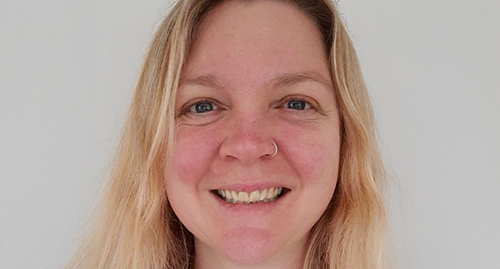Our graduates
Graduates from our programmes go on to develop successful careers in business, research, government and non-governmental organisations. Take a look at what some of our alumni are up to now.
Olivia Green
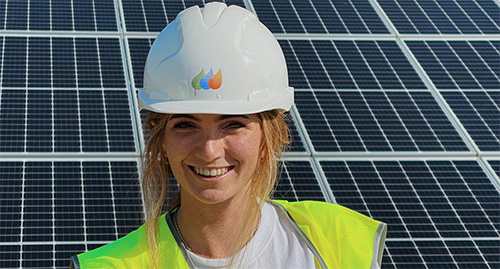
I am one of three people on the Mining Environmental Management MSc who studied Politics and International Relations as an undergrad here in Penryn.
I wasn’t sure what I wanted to do as an undergraduate and then in my third year we did a module with Deborah McFarlane called ‘The Resource Paradox. Blessing or Curse?’
Essentially it was about the politics of mining and how having an abundance of natural resources can cause conflict nationally and internationally.
I really enjoyed it, did really well, and became an intern for Deborah on her ‘People and Mining’ group which focused on the social aspect of the mining industry - which is what I’m interested in.
If I am to pursue a career in mining, I need to learn more about the industry. On the Mining Environmental Management MSc, I am learning to get all the terms right and understand topics like remediation, mapping software, and environmental, social and, governance (ESG).
The first term was very difficult, but I’m really happy that I did it. The work is very different, as I have moved from social sciences to subjects like chemistry. The challenge is the different style of work and using software which I haven’t needed to do before. We have much more contact time with more seminars and lectures than I’m used to - it means it’s easy to get answers to questions. The lecturers give us a lot of support and there are lot of extra things you can do like socials and annual diners.
Being part of Camborne School of Mines (CSM) is great fun. CSM is its own community within the University, everyone’s very down to earth and I really feel at home here. I’ve been trying to get involved in as much as possible to balance out the hard work.
I’ve taken part in training for the International Mining Games, part of The Camborne School of Mines Society, which is a competition involving events based on traditional mining techniques like Mucking - shovelling broken rock into a cart and running it down a track.
I’m also going to Belgium as part of International Student Week and try to get to as many Pint and Pasty nights as I can too. CSM invite companies in the mining industry to give a talk and then there is the chance to network afterwards. Opportunities for networking are really encouraged and exposure to industry experts has been amazing. We also got to go to the Mines and Money Conference in London for free too.
One of the reasons I chose the Mining Environmental Management MSc is because half of the course is a research project, which I can tailor to my interests.
My research project involves an internship at the International Finance Corporation which is a branch of the World Bank. I have a meeting with them every couple of weeks and am flying out to Washington in April to do some interviews.
I am going to do a cost benefit analysis for them on mine waste tailings that will encourage companies to invest in dewatering technologies to make mine waste solid in order to reduce the risk of spills from liquid slurry stores. The report will be shared with Chief Financial Officers in the mining industry and argue the environmental and social reasons for investing in this technology.
We’re not going to feed the energy transition or meet net zero if we don’t have mining. That aspect is something I’m really interested in. I want to contribute to building wind turbines and electric cars and sustainable mining of the materials, like copper, that are needed for them.
I’d like to work for an international body to do environment and social advisory work at different mine sites. This course makes me feel confident that I will find a job I will enjoy.
Guy Shungu from The Democratic Republic of Congo
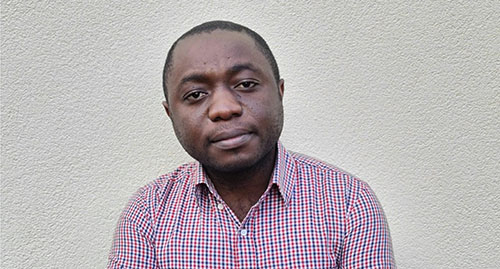
MSc Mining Environmental Management (2021)
From The Democratic Republic of Congo
Chevening Scholar
When I was looking for UK universities I found Exeter and chose it because it is Russell Group University and one of the top 200 universities in the world. I also felt like there were so many facilities and the programme I was looking was offered at the University of Exeter’s Penryn Campus. I know I wanted to study environmental studies that could be applied to the mining sector and MSc Mining Environmental Management is the perfect programme for this.
The programme itself is so wonderful and I particularly love the multidisciplinary aspect to the programme which covers various engineering and mining topics. The world is currently facing a lot of problems concerning mining waste so this Masters programme really focuses on real world issues, and we get to learn about how to deal with these issues and remedy them. I find it a very rich and interesting programme to study. I’m so happy to be here studying MSc Mining Environmental Management; it’s definitely well designed for someone who wants to work in the mining and environmental management sector.
I’ve also been really impressed with the quality of our lecturers who are always there to give guidance and provide you with all the materials that you want. Our lecturers are always ready to give us help if we need some extra support, we can just email them with any question and they will always reply which is amazing.
I really like living in Cornwall as I like the countryside, the nature itself surrounding the Penryn Campus is beautiful. The environmental landscape is so fresh compared to living in a big city. I like the campus too; the facilities are good. The Penryn Campus is very nice and you have everything you want. The services that are being provided even during the pandemic are really good; it’s easy to get any book you want from the library if you need it and if you want to study in Masters Suite you can. I do feel like we are being provided with the support we need during this time.
I also really like the research facilities available to us as we have many types of equipment in the labs so you can do your research and have all the equipment you need. When I was researching universities I found that a lot of other universities in Europe don’t have these facilities but we do at the Penryn Campus. It’s very good if you want to use that to do some in-depth research for example into mining waste.
When I arrived it was during the lockdown but as an international student I got a lot of support from the university. They call us every week to check on us and we’ve also been provided with online sessions about settling in. I really like the fact there is some support from the University especially for those affected by mental health issues which is important. When I arrive I had to do 14 days of isolation but was provided everything I wanted and the University were ready to help even provided me with food. From my flatmates, to lecturers, academic tutors and University staff, I’ve found everyone so welcoming and I’ve found I’m really getting a lot of support.
I’ve always wanted to contribute to a better world by improving the use of natural resources in a sustainable way, so I’d like to find a job contributing to solve the issues relating to the environment and sustainability. This could be in the mining sector or working for NGOs looking at responsible mining. I’m also thinking of doing a PhD later down the line so maybe I will be back!
Syed Shah Hamid Hussain
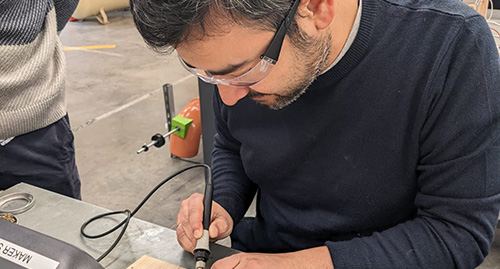
MSc student studying Renewable Energy Engineering, University of Exeter (current)
Find out about the MSc Renewable Energy Engineering
I did my undergrad in electrical engineering at Maharshi Dayanand University in India back in 2009. From 2009 to 2022 I worked in industry. To start with I worked for Fichtner Consulting Engineers as an Electrical Design Engineer. Then I worked with IL&FS Energy, a project management consultancy in the area of conventional energy and energy efficiency. I knew I wanted to move into renewables. Then Covid happened and I had a lot of time to think. That's when I decided I should do something different.
I was looking at a lot of British universities but I saw that Exeter offered the best modules in Renewable Energy Engineering which made me choose this university. The modules are designed really well. I particularly love the solar module and the low carbon vehicle module. The course is also designed well and the support from academics and lab technicians has been really good. It’s a one-year course so it’s packed full of assignments.
There have been a lot of pint and pasty sessions with a number of companies to help us network. It’s the best way to find a job because you interact on a personal level and can then send companies your CV. Companies travel to the campus from across the UK because they want to hire students from here. This is how I got a job with Photon Energy who are based out of Reading. For now, I want to work in the UK in order to understand how the industry operates as well as the market. Then I hope to start something of my own in India. That’s my ultimate goal.
Cornwall is beautiful. I come from New Delhi and it's so crowded and polluted. Coming from the city to a place like Falmouth where I now live is great. Falmouth is very quaint. Delhi is landlocked so it’s good to be by the sea. Leaving my mother behind in India and finding somewhere to live was hard at the start but then I found somewhere in Falmouth for my wife and me. On the other hand, being an international student here has been really good in terms of meeting people and making friends. The campus is really diverse and the university believes in inclusivity. It has all been so good. I’ve never been made to feel like I am from somewhere else.
Sututta Srisuwan
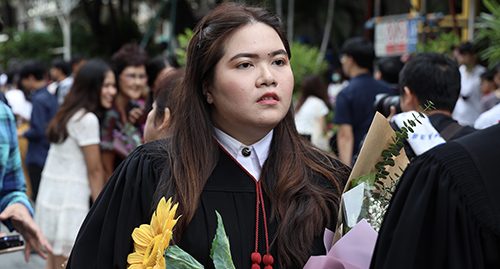
MSc Student studying Renewable Energy Engineering.
Find out more about the MSc Renewable Energy Engineering
My undergraduate degree was in chemical engineering in Thailand, but I have always been interested in renewable technology and have participated in seminars and study camps on the subject.
I wanted to complete a MSc that expanded my knowledge of renewable energy technology and have always wanted to study abroad. The UK was my first choice and when I looked up University rankings, I found Exeter.
I grew up in Bangkok and wanted to get away from the city, I was looking for a peaceful place to study and thought that, for me, Cornwall was the best place for this. I love being here, the beaches, the walks and living close to nature.
I started study for my MSc online, from Thailand, due to Covid. I was the only student completely studying online so it was very hard especially with the time difference and if there were group projects to be completed. After I had finished my first module, I decided to take a gap year and started on campus in January to complete my course.
I am enjoying everything about the course. It is totally different to how I was learning in Thailand. In Thailand you don’t discuss the topics much in class, the lecturers present and then you take the information away learn it and take the exam. Here the lecturer not only talks but gives us time to think and discuss what we are learning. In addition to class, we do lots of experiments to improve our understanding of renewable energy in the real-world. Through the University we have access to different types of software that allow us to undertake test simulations, there are useful seminars and field trips where we can gain practical experience.
My course mates understand that I had to take a break due to Covid and they are really friendly and helpful. The lecturers recognise that about half of the course is made up of international students, so they adapt their approach to help.
I am living in accommodation on campus and my flat mates have shown me where to go and how to find things. I know where to go for support if I need it and have attended the Intercultural Café a few times. I met another student from Thailand there which was great.
I am taking the MSc in Renewable Energy Engineering because in Thailand we don’t have many skilled professionals in the renewable energy sector, but we do have lots of sunshine. I want to help make Thailand more sustainable and give it a greener future by using the skills and knowledge I have acquired to work in and grow the sector in my home country.
Nell Smirthwaite
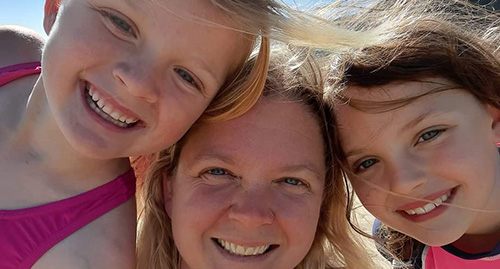
MSc Sustainable Development programme graduate
I studied History at Bristol for my undergraduate degree back in 2001. It wasn’t that I had a clear career goal but chose History because I enjoyed the subject.
After graduating in 2004, I did some travelling and then worked in the charity sector, initially in contract funding and then in operational management and strategic development. I had always been interested in how businesses and charities operate to bring about changes to society; and how there are different ways of doing things in a social economy.
I took a career break to raise my children but was still interested in the changing nature of businesses and charities in affecting change, so I started a blog. I interviewed people like the CEO of the Eden Project, the CEO of LEAP - one of the first B-Corps in Cornwall, and a great charity that was doing some interesting work in education in Ghana. I then went on to do some consultancy work and ran ‘Business from the heart’ workshops, helping small businesses in Cornwall operate in a way that is more mindful of the environment and its employees. I found there was a lot of interest; a lot of people have moved here for the lifestyle and fulfilment in what they are doing. Not all businesses are purely driven by profit. And that was when I became more interested in the B-Corp model of business amongst other emerging models that changed the way businesses were operating, as well as emerging frameworks for sustainability in policy making such as Kate Raworth’s Doughnut Economics. As the children were getting older, I thought about going back to work when I saw the Masters in Sustainable Development and realised it was a good way of bringing together everything I was interested in and had experienced and would help progress my career in this area. I studied part-time and deferred my dissertation a year due to Covid but completed the programme in 3 years.
I was able to commute to campus for lectures and seminars from my home in Cornwall. Having the opportunity to study this subject in my home county was brilliant and something I couldn’t do when I did my first degree. It was exciting to be joining the University of Exeter, a high-profile Uni with a great reputation. I was also aware that the ESI was at the forefront of great research in sustainable development.
Being a mature student, going back to a learning environment and applying myself to my studies was hard but I really enjoyed it. It was a juggle managing family and studying, but I learnt to be disciplined, splitting my time between being a good mum and a diligent student.
Covid was a big challenge, but there were also some positives. Going online was brilliant, as it saved my commute; an hour seminar was just an hour instead of a day out. Studying and home schooling my children was a challenge. I had also taken on a 3-month research assistant role just as we entered lockdown. Working two days a week, doing a Masters and home schooling was tough but we made the most of it and had good times too, with the girls home and lots of sunny weather.
The Masters in Sustainable Development is taught via a combination of lectures, seminars and field work, as well as the opportunity to focus on your own specific areas of interest, such as learning about how to affect policy which was an area I was becoming interested in
I enjoyed learning how to conduct independent research and got a buzz from doing the first mini practical. I can now see why people go into research, it’s quite exciting. There was a good focus on how to be analytical in your research and how to approach writing up your research in an analytical way. The module was called ‘Transdisciplinary Methods for Sustainability Science’. I found this really interesting and valuable, especially as I didn’t have a scientific background.
My absolute highlight, though was doing my dissertation, which was ‘An explorative study into the barriers and drivers of multinational companies adopting a B-Corp model.’
I had great support from my tutor, who was always very responsive and gave good advice. And my dissertation supervisor was brilliant; she would listen to me, let me explain my various crises when I was struggling, and gently and constructively give me some clear tips on how to move forward. This clear direction would help produce results. She was patient and calm during my moments of panic!
Despite this, I really have enjoyed all of it. It’s been such a different experience and environment to when I first went to university; I’ve been surrounded by inspiring women at the peak of their academic careers, doing exciting and meaningful research.
I think Cornwall lends itself to studying sustainable development because we have so much green space and proximity to the sea. Cornwall is leading the green revolution, investing in renewable energy, so it’s also good place to have a qualification in Sustainability. There are many opportunities to apply that to your career here, in sectors such as offshore wind, marine and renewables.
I come from Cornwall and grew up here. It’s a very different place now to what it was in 80s; it’s a very exciting place to live and is embracing the new challenges and opportunities of the 21st Century. We have lots to offer, in terms of the renewables sector and a business culture that is leading the way in making fundamental changes to operate in more sustainable ways. It’s an inspiring place for me to be professionally.
I am now working for Cornwall Council as a strategy and implementation officer for the Good Growth team, implementing strategic prosperity funding. This is the levelling up funding that is coming to Cornwall. The underlying principle of the fund is good growth, so that means I’m supporting projects that pay the living wage or looking to achieve net zero and reduce carbon emissions, either by adopting circularity principles or through nature recovery. Those principles underpin the program. It’s an exciting way of being involved in embedding sustainability in Cornwall and bring about change.
I have stayed in touch with other MSc students, both personally and professionally. It’s lovely to see them develop their own careers. You hope you’ll be one of lucky ones and get a job where you can apply what you’ve learned on the Masters. The people I have kept in touch with really have done this, and they are now part of my professional network.
Igazeuma Okoroba

MSc Sustainable Development graduate from Nigeria.
Today there is a growing awareness of sustainable development in business in Africa but when I decided to undertake the MSc at University of Exeter, Cornwall in 2009 it felt like a bold step. I was not aware of any Nigerian University offering the course.
I chose the Sustainable Development MSc as it was multi-disciplinary. Human geography interwoven with economics, social and political issues, it wasn’t just about business or management. I was particularly interested in an MSc rather than an MA.
After graduating from the Rivers State University of Science and Technology in Nigeria I became interested in Social Sciences and Health, Safety and Environment (HSE). I decided to quit my job and become a full-time Masters’ student for a year.
I was considered a mature student and with the support of my family, I was able to leave my children (who were toddlers at the time) to study in a place that was very different to home.
I wanted to experience British culture, but it was quite shocking at first as I was the only black person in my class and even when I went into town (Falmouth) I would see a sea of white people. However, I adapted really quickly and got to know other Nigerians on different courses.
My class liked the diversity I brought to the course, they were very friendly and warm and were interested in hearing my developing world perspective. Hearing first hand from someone who lived and worked in Nigeria’s Niger Delta I think they found my perspective interesting and valued the contributions. I had been working in the oil and gas industry which is not an industry that is viewed well in Africa with its record of pollution and human rights issues.

Studying in the UK was very different to studying in Nigeria. It was easier because lectures were interactive and most of the time, in sustainable development, the answers to our questions weren’t from a pre-set mindset. You were encouraged to give your opinion based on the principles of your course. I would receive feedback on the work I did, which was different. Initially I wanted to know what the lecturer wanted me to say until I got used to the idea that they were going to pay attention to what I wanted to say and test my knowledge. It developed my confidence in my views and how I supported them with my knowledge and understanding.
The most challenging part of the course was academic writing. I had some experience of writing for the media and undergraduate writing, but Exeter was my first experience of academic writing. You have to consider different sources of literature, analyse it and validate what you’re writing. It was a vigorous approach which took time to learn. The resources in the library were very useful for looking at the ways other people wrote so I could develop my own style. I used the library a lot.
My favourite thing was the presentations that we had on the course sustainable perspectives. We presented term papers and the topics were always very engaging, people would talk about things that meant a lot to them like GM foods and cycling. My interests were around topics like social cohesion and gated communities. The lecturers would encourage you to challenge the way you thought about the topic and not accept what you initially understood the subject to be.
While I was still at Exeter my previous company contacted me to say they now had a Sustainable Development department and invited me to join it.

I started a new contract as a Regional Development officer in the Sustainable Development division. It was very gratifying to see that my MSc was being recognised. Since then, my career has been in sustainable development. I am now Head of Sustainability for Dangote Cement, which has operations across ten countries in Africa. My previous roles focused on sustainable development as part of corporate social responsibility but now I am involved in the integration of Environmental, Social and Governance (ESG) in business operations. My team looks for ways to improve our ESG impact. The job cuts across all functions of the company, creating strategy that influences the whole value chain to help us improve on our ESG performance.

What I have studied has enabled me to build my capacity for problem solving and innovation. I have to understand different aspects of an organisation and act as a change agent to persuade people to work in ways that benefit the business and society.
I count myself as very privileged that I took the Masters’ before there was as much awareness of sustainability as there is now. There is a demand for people to work in this field and I still find it difficult to recruit people with the right knowledge and skills to my team.
John Francis
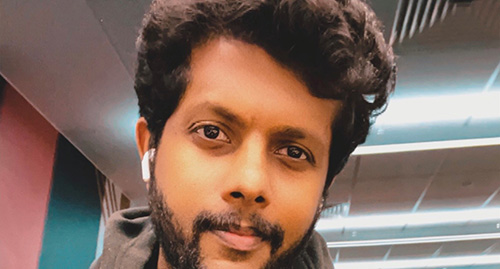
MSc Student studying Applied Data Science (Environment & Sustainability)
First off, please give us a bit of background about what made you choose to study with us at the University of Exeter in Cornwall?
When I decided to do my masters in the UK, my priorities were to do it at a top Russel group institution and at a place which was unique and far from the city rush. At the Penryn campus I have both, and the beautiful beaches are only a stone's throw - which was a bonus.
We’re glad you had such great opportunities! What did you enjoy most about studying in Penryn?
It is a beautiful campus with very helpful faculties and state of the art facilities. I could access the computation facilities anytime on campus and off campus by using my credentials. It’s perfectly safe in the campus even at the late hours.
Can you give any advice for students who might want to pursue a similar career?
Be ready to work hard and put in a lot of work. Be passionate about what you want to do. Data Science is a very dynamic and an ever-evolving field. The possibilities are infinite so make sure to utilise them.
Finally, do you have any advice for anyone thinking of applying to any of our programmes in Applied Data Science at the University of Exeter?
Understand the depth of the modules you are going to take and come prepared. The course directors and faculties are always there to guide you, use them to the maximum.
Josh Blannin
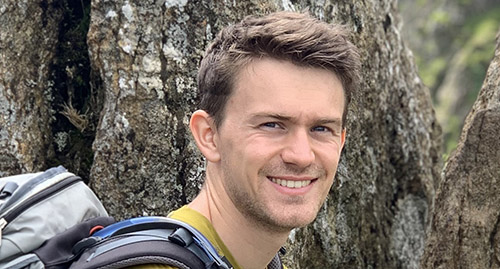
MSc Student studying Applied Data Science and Modelling
First off, please give us a bit of background about what made you choose to study with us at the University of Exeter in Cornwall?
My background is an MSc in Physics and I worked for about a year at the Science Museum in London. I became increasing interested in coding, statistics, and machine learning, and eventually decided I would return to studying. I chose the University of Exeter because they offered an Applied Data Science course, which covered topics I was keen to learn more about. The Penryn campus has good links with the ESI and lots of environmental research which made Cornwall very appealing as I hope to use what I’ve learned for the purposes of environmental monitoring and solutions.
So what did you enjoy most about studying methods to understand data and modelling tools for solving challenges?
I found it fascinating to learn how broad the field is. There are many different statistical tools and modelling types available to solve complex problems. It has also been great to work with varying data types – measurements, surveys, images, etc – as information can be gained from so many different sources.
Finally, do you have any advice for anyone thinking of applying to any of our programmes in Applied Data Science at the University of Exeter?
Be prepared to do some maths (it underpins at lot of data science and modelling) and some familiarity with coding can help. Additionally, having a field that you’re interested in applying these skills to, will make it even more motivating, because then the methods and results both become interesting to you personally.
Jessica Fishburn
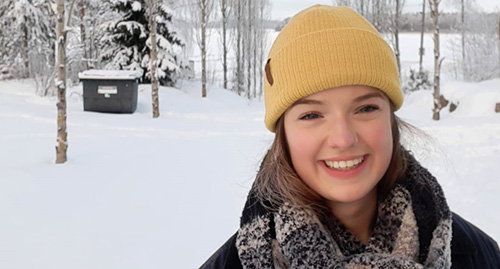
MRes Sustainable Futures graduate from the UK (2021)
Currently studying a PhD in Finland.
I originally grew up in Surrey just outside of London. I wasn’t always sure that I’d want to go to University, but while studying GCSEs and A Levels I looked into it more.
After coming down to Cornwall to visit, find out more and speak with programme directors I just thought ‘wow, it’s so nice down here’ and was impressed with how friendly and passionate the people running the course were.
So, I ended up studying a BSc in Business for three years in Penryn, with a lot of focus on sustainability as I’d always enjoyed studying this and learning about the environment. I really loved it, and this led me onto staying to study a Masters in Sustainable Futures.
It really suited me as I’ve always been quite a shy person so the fact it was a smaller campus with smaller classes made it easier, and there’s still lots of student activities going on. Of course, there’s so much outdoors space and the beaches, who doesn’t love that? And perfect for the course too really.
Typically, I got into surfing, I’m awful at surfing but I just love it. I joined a women’s surf club and was also part of the horse-riding society while an undergraduate, so that was great. Having a car also allowed me to explore more of the area, Kynance Cove is my favourite place, as well as St Agnes, St Ives and Penzance – actually every part of Cornwall is so nice!
On my MRes we were encouraged to network with local companies and this was so enjoyable and rewarding, especially working with Cornish businesses.
I really enjoyed working with social enterprises and charities, it was really interesting to get to know local companies, help support them and do something where you can actually see you make a difference.
One of the biggest challenges was that [because of starting a MRes during the pandemic] pretty much all of the course was delivered online. So, you had to have enough self-discipline and motivation to carry on with everything whilst this crazy stuff was going on in the world.
But I was really lucky in the respect that people I’d met on the course, and friends from undergraduate as well, were so supportive and we were able to be there for each other.
The course leaders were also very supportive of us and kept in contact to check in between pre-recorded and live lectures. My lecturers and professors were probably the best thing about my university experience as they were just genuinely very caring of you, and with the smaller class sizes they knew everyone personally.
Also, the quality of the course was really good, even though it was taught online, and you could struggle to get the same kind of experience as in person. It was just a different experience, but in terms of the research methods that were taught it was really good and I got a lot out of it.
Something I have advised people on since is the funding for the Masters.
In order to cover my tuition and living costs I took out the maximum postgraduate loan, worked part-time at a restaurant, and I also received a grant from my previous supervisor to provide administrative support on developing a Handbook for Circular Economy - which I was very grateful for not only for the financial support but the experience of putting together a book manuscript.
It was extremely difficult to balance all of these responsibilities, especially on a full-time programme, but I am a particularly determined person, and this is something I really wanted to do, so I made it work.
Essentially, that is the advice I offer to others, it is not easy but if you really want it there are always ways to make things work and be proactive in finding support.
I was offered a brilliant opportunity to work on an EU Horizon 2020 project with lots of international mobility and industry experience while studying for my PhD at LUT University in Finland.
I’m still in touch with a lot of the lecturers in Penryn now actually, even the ones that I didn’t get to work with. Their support and the research techniques I learnt on the course have been really helpful while I’ve been out here.
It’s funny as all my friends and family knew how much I loved Cornwall and were shocked that I left, but I’ll definitely be back and am looking forward to my two graduations later in 2022!
As for the future, I think I’d like to stay in academia, but closely connected to industry, and continue to research sustainability in business in hopes to make impact with my work.
---------
Please note that Jessica studied her Masters’ during the Covid-19 pandemic when the teaching was online, currently the majority of this course is taught face to face.
Megan Strahle
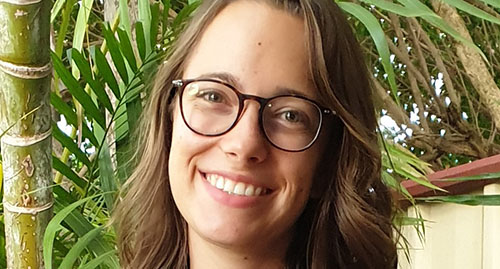
MRes Sustainable Futures (2021)
From the US
I’ve worked in the events and tourism as well as studying for about the last 10 years and when I was studying in Australia one of my professors said that it was my generation’s job to solve the world’s sustainability and environmental issues. This realty resonated with me and made me want to help change things which is why I decided to study MRes Sustainable Futures.
I chose the University of Exeter’s MRes Sustainable Futures as I wanted to focus on sustainability but also wanted the flexibility to do something not completely science focused. I also wanted to live in Cornwall as I love the outdoors and love being by the water.
I never really thought about what a research degree would be like but I was pleasantly surprised by it. I love how we also have classes and modules we can pick as well as the research side of the degree. I’ve really enjoyed all my modules and its nice being able to pick optional modules that I’m interested in; I picked some that focused on sustainability in the real world. I also did a climate change class that I thought would be hard because it is science based, however my lecturer was amazing and was able to explain things in a way so that someone who’s not a scientist can understand it. She’s so good at teaching it was one of my favourite classes.
There are also tons of dissertation project opportunities with Environment and Sustainability Institute (ESI) which is based on the Penryn Campus. For example, one of my course mates is sitting in on a housing inequality project and I’m sitting in on a sustainable tourism project and we’ve both been enjoying this experience.
I have found the lecturers are quite open minded as everyone is from different backgrounds and they enjoy hearing different perspectives and ideas. It’s nice as there’s a very open dialogue in classes which I really like as it opens communication and gets you to see things from a different perspective. I’ve really loved all my lecturers at Exeter.
I love living in Cornwall and got really lucky and found really great housemates which has been nice. I’m very outdoorsy and love being near the water and even though everything is shut due to lockdown you can still go out and experience the outdoors. Haven’t been able to see the rest of Cornwall yet due to lockdown but I still love it and I love the community feel that it has.
As an international student arriving during a global pandemic, I felt that the support we received was great. Before starting at Exeter, the University kept me updated on what was happening every two weeks and helped us navigate the confusion around the pandemic. They were definitely great at communicating and were there to reassure us and give advice. It made me and other international students not feel lost when starting at Exeter; it was a really great start.
Everyone has been very welcoming and I have made some really good friends. For example, we’ve made a journal club where each week we read an article on sustainability and then debate it. My favourite thing about the programme so far has been making some really good friend even though we haven’t always been able to meet in person.
As I’m an older student, I was worried that everyone would be much younger than me. However, there’s a nice mix of ages on the programme. If anyone is hesitant to apply because of their age, they shouldn’t be. I love that every single person is from a different background and I’ve learnt so much from so many different people that I would have never known before coming to study here; I’ve really enjoyed this aspect of studying.
